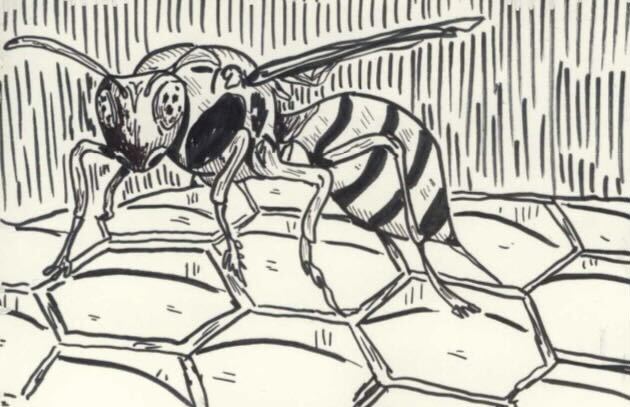Poetry | Hive
March 23, 2023
Buzzing blinking driving shrinking,
Just like that, you’re down at the edge of the street,
Past the concrete, one turn of your car wheel and
you’re lost, swarming
Back into the bumble of tires scratching
and wearing out the road,
exhausts cackling because they know they’ve won.
I’m still standing there, I haven’t moved. Because I like to see you drive away,
So I at least know you made it as far as you could while I could safely see you.
And black carbon clouds laugh at me from above, mad that I waited for you.
I never stand much longer, afraid of that swirling and sputtering carbon monoxide,
mixing with diesel and embedding deep into my lungs between the places I can’t see.
I can smell the litter from the street.
A snapped, blue toothbrush with dirty bristles brushing blades of grass in the park.
A broken glass bottle almost looks beautiful when the sun hits it in just the right light.
A worn out couch, a vacuum, a desk sitting at the edge of the curb, like
Someone inverted their living room, or their walls disappeared one day,
I don’t want to see what lies between the walls
of their honeycomb house.
But now it’s on display, and we distract ourselves
with the fluid, natural movement of our neighbors in flight.
I watch their working wings and wonder why
The man always shouts at me from his porch,
to tell me that I should wear a jacket,
or that I shouldn’t wear a jacket.
The woman eyeing the kids walking to the basketball court at the end of the street,
One hand pressed to her chin and the other excitedly
pressing three little numbers on her screen,
But then again there’s always something to buzz about.
When I stand on my street,
I feel the heat of the buildings’ smoke
blending with the sun on my skin.
And getting lost into that generator hum of
whether I need to wear a jacket,
or how she gets mad at the kids,
the life of the honeycomb houses.
I can’t stop breathing it in,
and neither can you, or any of us.
From the upstairs window in my room, I want to pretend
that I’m watching the world on the edge of a cliff.
In it I can pretend that it’s my world where
nothing is my fault, our faults,
and I can feel bothered by the man on the porch,
And convince myself it really is a big deal that the kids are playing basketball.
Where I can put that conch shell —
the one that you dived in the blue water of Belize,
took the sand out of it, and thought about me —
up to my ear, and I can feel it still
and still cool, even though if I didn’t know your hands stole it from on the ocean floor,
it would look like a dime a dozen, and likely be worthless to me,
in this factory of nature.
I want to pretend I can hear the ocean
as stupid as it sounds, and feel
my feet burn under the sand cooking from the sun
and maybe get a sun spot
because there’s worse things than sun damage, right?
And as I thought about it, a wasp
Flew into my screen, winding its legs as if
It was weaving through the metallic mesh like
It was trying to solve a Rubix cube or like
It was working at the assembly line in a gray factory,
Working hands in rhythm to the buzz of an electric generator.
I wasn’t scared, because I knew the wasp would never get in.
But I liked to watch him try, because it made me nervous to see him work so adamantly,
and it made me wonder why he cared so much.
Weaving and buzzing its pointed stringer and winding legs,
trying to solve the puzzle, with its little needle hands
crocheting its way through the tiny squares in my screen.
I was fascinated by those brilliant, busy hands.
That kept on making and making,
trying and trying.
Lynnette Tibbott primarily writes about topics in the sciences and humanities. Write to her at [email protected].









